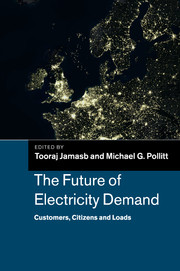Book contents
- Frontmatter
- Contents
- List of Figures
- List of Tables
- List of Boxes
- List of Contributors
- Foreword
- Preface
- Acknowledgements
- Introduction and overview of the chapters
- Part I The economics
- Part II Technology
- Part III Social dimensions
- 9 From citizen to consumer: energy policy and public attitudes in the UK
- 10 The local dimension of energy
- 11 Centralization, decentralization and the scales in between: what role might they play in the UK energy system?
- 12 Equity, fuel poverty and demand (maintaining affordability with sustainability and security of supply)
- 13 Energy spending and vulnerable households
- Part IV Policy and regulation
- Index
- References
9 - From citizen to consumer: energy policy and public attitudes in the UK
from Part III - Social dimensions
Published online by Cambridge University Press: 05 March 2014
- Frontmatter
- Contents
- List of Figures
- List of Tables
- List of Boxes
- List of Contributors
- Foreword
- Preface
- Acknowledgements
- Introduction and overview of the chapters
- Part I The economics
- Part II Technology
- Part III Social dimensions
- 9 From citizen to consumer: energy policy and public attitudes in the UK
- 10 The local dimension of energy
- 11 Centralization, decentralization and the scales in between: what role might they play in the UK energy system?
- 12 Equity, fuel poverty and demand (maintaining affordability with sustainability and security of supply)
- 13 Energy spending and vulnerable households
- Part IV Policy and regulation
- Index
- References
Summary
Introduction
Interest in the role of the individual and the community in tackling major energy policy challenges has increased significantly over the past decade in the UK and internationally. The main challenges addressed by UK energy policy are climate change and the transition to a low-carbon economy; diversity and security of energy supply; and supporting consumers by overcoming fuel poverty and improving energy efficiency. Long-term continuity of policies concerning the above areas as well as that of liberalization of the energy sector is largely dependent on support from the public. The Department of Energy and Climate Change (DECC) was created in October 2008, mainly in recognition of the fact that these challenges are interlinked and require comprehensive policy making. Each of these challenges also involves an important role for the demand side. For households this includes a role for individuals as consumers of energy as a commodity on the one hand, and as citizens with social and political responsibilities on the other (Devine-Wright, 2007).
The role for consumers in an advanced liberalized energy market such as Great Britain is further augmented due to retail competition: consumers can choose supplier and switch to an alternative supplier if they are dissatisfied with price, quality or customer service. They may also be more exposed to changes in energy prices. As citizens, individuals may participate both privately and collectively in policy-making processes. The degree of participation depends in large part on the willingness of policy makers to engage with the public. Until now, public engagement in UK energy policy making has been based on the information deficit model or the rational choice model. The assumption at the heart of these models is that improving awareness and understanding through providing information is central to encouraging sustainable behaviour and public acceptance for sustainable solutions, e.g. the siting of new wind-turbine developments (Owens, 2000; Owens and Driffill, 2008). This is beginning to change, however, and a number of recent studies have attempted to integrate a more sophisticated approach, acknowledging that the link between attitudes and behaviour is complex and influenced by a range of social, political, institutional and cultural factors (Jackson, 2005; Defra, 2008).
- Type
- Chapter
- Information
- The Future of Electricity DemandCustomers, Citizens and Loads, pp. 231 - 248Publisher: Cambridge University PressPrint publication year: 2011



